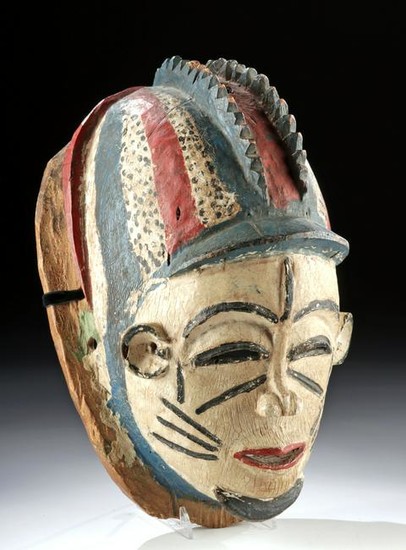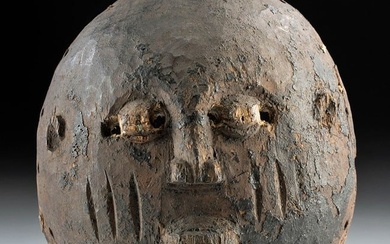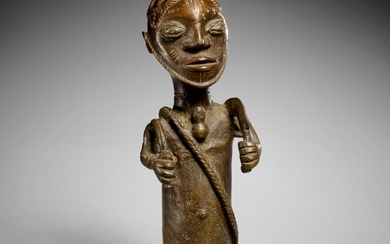20th C. African Yoruba Painted Wood Gelede Mask
**Originally Listed At $600**
West Africa, Nigeria, Yoruba, ca. first half of the 20th century CE. A lovely example of a hand carved wooden Gelede mask that is painted with white, blue, black, red, and green pigment. The face mask displays an abstract countenance with slit-form eyes outlined in black, protruding ears, a slender nose with flared nostrils, red lips, and several scarification marks on either cheek. A tall, rounded headdress is adorned with vertical red and blue stripes, with black dots adorning the white stripes, a pair of serrated crests on the front, and a red serpent draped across the verso. Two drilled strap holes are presented behind both temples, and the protruding periphery acts as a barrier between the mask and the face of the Gelede performer. Lucite display stand for photography purposes only. Size: 8.3" W x 13.3" H (21.1 cm x 33.8 cm)
Gelede performances, intended to both entertain and educate, utilize narratives and movements that represent Yoruban ideals of male and female conduct. They are also meant to document interesting elements of everyday life, such as the transgression act. For the Yoruba people, Gelede masquerades are a means of celebrating and recognizing the importance of females to their society, as the Gelede society - whose purpose is the perpetuation of peace - is devoted to the mother of all orishas (deities), Yemoja, who represents motherhood, family, sexuality, nurturing, and protection, and is viewed as the matriarchal head of the universe. Masks like this example are traditionally worn by male performers at festivals honoring the women of the community, both alive and deceased, especially the highly revered "Great Mothers" who include both the elderly females and the ancestors of Yoruba society.
Provenance: private New York, New York, USA collection, acquired in 1987; ex-James Willis Gallery, San Francisco, California, USA
All items legal to buy/sell under U.S. Statute covering cultural patrimony Code 2600, CHAPTER 14, and are guaranteed to be as described or your money back.
A Certificate of Authenticity will accompany all winning bids.
We ship worldwide to most countries and handle all shipping in-house for your convenience.
#150357
Condition Report: Minor chips and abrasions to face, helmet, peripheries, and verso, with chipping and light fading to original pigmentation, and light encrustations within some recessed areas. Great patina, traces of original pigment, and craquelure throughout.
View it on
Estimate
Time, Location
Auction House
**Originally Listed At $600**
West Africa, Nigeria, Yoruba, ca. first half of the 20th century CE. A lovely example of a hand carved wooden Gelede mask that is painted with white, blue, black, red, and green pigment. The face mask displays an abstract countenance with slit-form eyes outlined in black, protruding ears, a slender nose with flared nostrils, red lips, and several scarification marks on either cheek. A tall, rounded headdress is adorned with vertical red and blue stripes, with black dots adorning the white stripes, a pair of serrated crests on the front, and a red serpent draped across the verso. Two drilled strap holes are presented behind both temples, and the protruding periphery acts as a barrier between the mask and the face of the Gelede performer. Lucite display stand for photography purposes only. Size: 8.3" W x 13.3" H (21.1 cm x 33.8 cm)
Gelede performances, intended to both entertain and educate, utilize narratives and movements that represent Yoruban ideals of male and female conduct. They are also meant to document interesting elements of everyday life, such as the transgression act. For the Yoruba people, Gelede masquerades are a means of celebrating and recognizing the importance of females to their society, as the Gelede society - whose purpose is the perpetuation of peace - is devoted to the mother of all orishas (deities), Yemoja, who represents motherhood, family, sexuality, nurturing, and protection, and is viewed as the matriarchal head of the universe. Masks like this example are traditionally worn by male performers at festivals honoring the women of the community, both alive and deceased, especially the highly revered "Great Mothers" who include both the elderly females and the ancestors of Yoruba society.
Provenance: private New York, New York, USA collection, acquired in 1987; ex-James Willis Gallery, San Francisco, California, USA
All items legal to buy/sell under U.S. Statute covering cultural patrimony Code 2600, CHAPTER 14, and are guaranteed to be as described or your money back.
A Certificate of Authenticity will accompany all winning bids.
We ship worldwide to most countries and handle all shipping in-house for your convenience.
#150357
Condition Report: Minor chips and abrasions to face, helmet, peripheries, and verso, with chipping and light fading to original pigmentation, and light encrustations within some recessed areas. Great patina, traces of original pigment, and craquelure throughout.





